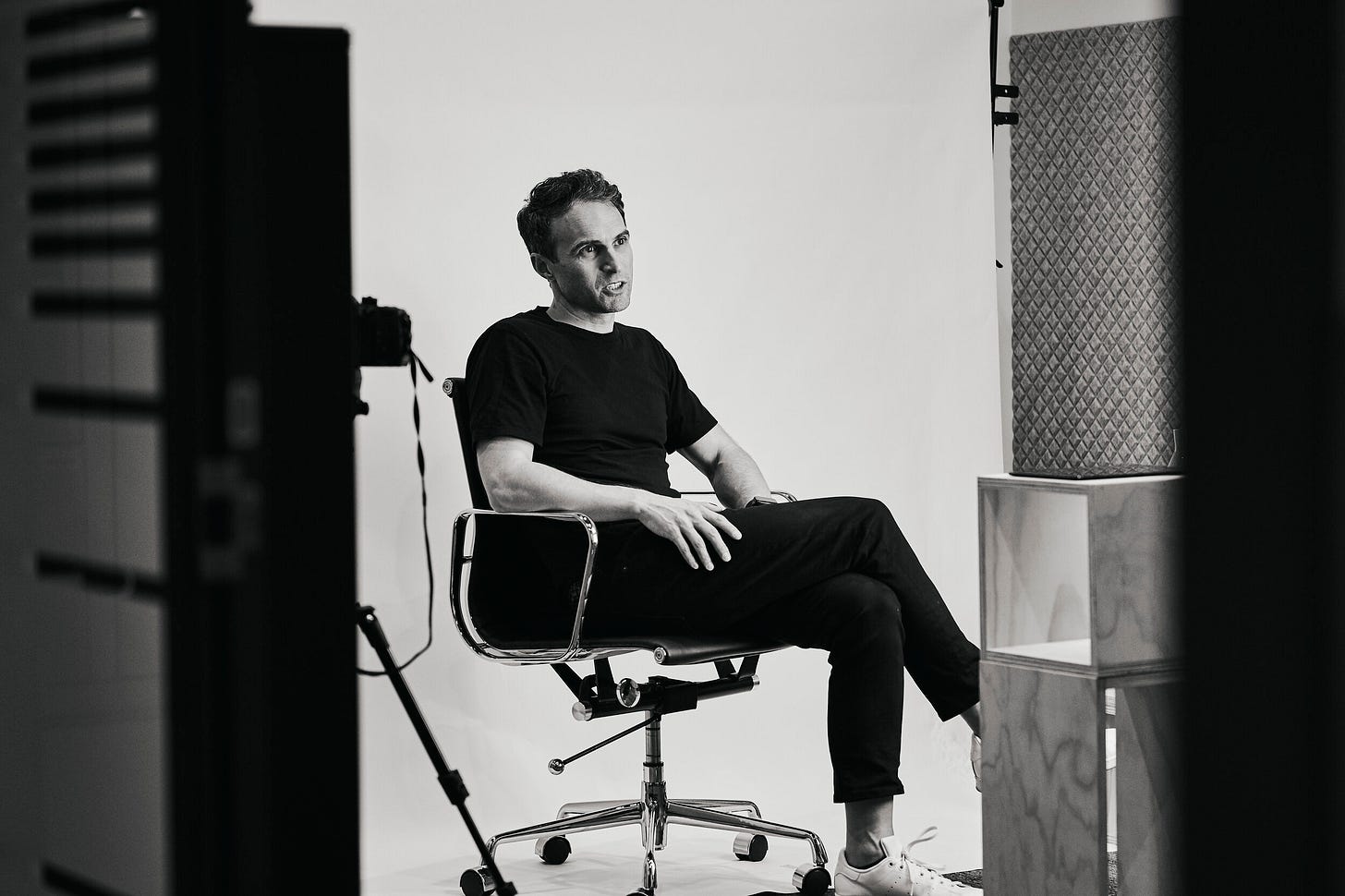Sensory Deprivation, float tanks, imagery and hallucinations
Curated, Science-Driven Insights into the Brain.
Future Minds newsletter breaks down the science of the mind and brain into short and easy-to-digest insights and actionable take-homes. Sign up and join the many others who receive it directly in their inbox.
Hello, dear readers! Welcome to this week’s newsletter.
As we teased in last week’s newsletter we are about to launch a paid premium version of the newsletter. In the Premium Membership, you will get our Free Future Minds Newsletter PLUS:
Exclusive access to our new unpublished data (Aphantasia & imagery), hot off the press so you and your businesses can start benefiting straight away. We have a long queue of unpublished projects, that you haven’t seen yet as it takes years in science for data to be published. Typically the only way to hear about such cutting-edge data would be to travel to expensive conferences around the world. In this new premium offering, you will hear about it first from us!
I’ll also review papers from other labs, conference presentations, any neuroscience ground-breaking news, etc. I will digest it for you so it’s easy to read and apply in a practical way to improve your life.
Exclusive access to Q&A sessions, where you can submit your questions and get personalised answers.
Access to the Future Mind Community- where people with Aphantasia and people interested in the brain/mind can relate to each other, with easy access to me to answer your questions and hear your concerns, interests, and personal brain/mind experiences.
For all these to happen and be sustainable, we need to make it a paid Membership, a lot of work goes in behind the scenes to bring all this to you, and we want to build something new and different. Watch this video to learn more about our Premium Membership:
In the meantime, we hope you enjoy today's edition!
At a glance:
Sensory deprivation through floatation can induce hallucinations, affecting perception and consciousness.
The brain adapts to sensory loss by repurposing inactive areas, as seen in blind individuals who learn Braille.
Float tanks are linked to increased creativity and improvements in stress, anxiety, pain management, sleep quality, and exercise recovery.
The Sensory Expedition: removing stimulation does some amazing things
The float tank, a technique that dates back to the 1950s, has surged in popularity, thanks in part to advocates like Joe Rogan. The essence of float tanks is to offer a space of tranquillity where one floats in water matched to body temperature, embraced by air just as warm, all in an environment devoid of light and sound. You are suspended in weightlessness, in a cocoon of warmth and none of your senses are being stimulated.
This practice of sensory minimization, known in the scientific community as Restricted Environmental Stimulation Therapy (REST), was introduced by researcher Peter Suedfeld in 1968.
Hallucinations and imagery
One of the most common reports post flotation REST is altered states of consciousness. Research shows that people report a deep sense of relaxation commonly accompanied by auditory and visual hallucinations, altered perception of time, the occasional out-of-body experience and even changes to self-perception, which last beyond the float session.
I find this fascinating, why would taking away sensory stimulation result in hallucinations and or imagery?
I would love to hear from anyone here who has aphantasia, and has tried any type of sensory deprivation, particularly float tanks, and had any type of experience of imager- do tell us all about it!
This work reminds me of some of the classic blindfold studies that report people who were blindfolded, which completely cut out all visual stimulation, started reporting visual hallucinations within five days. Many of the participants in these studies reported visual hallucinations after the first day of wearing the blindfold, which is amazing when you think about it.
One of the theories behind this, that David Engelman, one of my friends and colleagues has talked about is that the visual cortex is in a dynamic flux state and is effectively fighting for cortical real estate within the brain. In other words, if the visual cortex becomes quiet (non-active) because of a lack of stimulation, then other parts of the brain might try and take this area over. We see this in studies of people who have lost their vision and become blind and start learning Braille, within relatively short periods of time the visual cortex starts responding to them reading Braille, almost like it would if they were seeing text. In other words, the visual cortex once dedicated to processing pure visual information, begins to process tactile information from their fingertips. The idea follows that when we go to sleep or sensory deprivation, the visual cortex becomes active with its own content (hallucinations, dreams, imagery) to prevent other areas from trying to take over its function. Hence the visual hallucinations and increased imagery serve the role of effectively defending and reserving the visual cortex for visual processing.
Boost in Creativity
Research has shown a link between sensory deprivation in a float tank and improvements in measures of creativity. Studies tend to be designed in the following manner, participants would take a creativity test, then one group goes into a float tank while the other control group sit in the dark room for the same half hour, then both groups would again fill out a creativity test. Those who were in the float tank condition had a larger increase in scores of creativity.
Treatment for stress and anxiety
Multiple studies have reported positive psychological effects of float therapy. One of the common themes in some of these studies is the significant reduction in measures of anxiety and even depression. Hence, it seems like a really interesting strategy to include some float tank therapy in any action plan to treat anxiety. Importantly, some of the participants high in anxiety did report an initial increase in anxiety when starting the float session, however over time this reduced and the overall effect was of a reduction in anxiety.
One thing I’ll say here from my personal experience with float therapy is to not use the small ‘coffin’ tank style, look for one of the whole room models, that way you can avoid any claustrophobia.
Example of a whole room float ‘tank’.
Pain
Multiple studies have found evidence in support of the analgesic effects of flotation-REST. It was found to alleviate pain stemming from a variety of disorders, including stress-related muscle tension, chronic pain disorder, Whiplash Associated Disorder and tension headaches, again really interesting research and something to keep in mind.
Insomnia
Have you ever suffered from insomnia? Well, emerging data suggests that sensory deprivation via float tank can help with that! New data suggests that a single float session can significantly improve measures of self-reported insomnia, not just for the night immediately after, but ongoing for the nights after that. Importantly, these studies are from people keeping a sleep diary and not from direct brain measures of sleep during the night.
Exercise recovery
You may have recently heard about ways to boost recovery after exercise or going to the gym, well it turns out that sensory float tanks can help. Research has shown that a float session immediately after high-intensity exercise reduces subjective muscle soreness, hormones, mood and fatigue. Which is both interesting and exciting if you're an athlete training hard or just enjoying the gym. It does seem that putting yourself into a recovery relaxation mode after stressing out your body can accelerate the recovery.
Time perception
Time perception is something I'm fascinated with, in fact, we have a prior newsletter on this topic here. One of the things that struck me in the float tank sessions I've done is the complete loss of time perception. I typically stay in a float tank for about 45 to 50 minutes and it's often hard for me to tell whether 5 -10 minutes or the full 45 minutes has passed. I've had discussions with people about this and I think it has something to do with the lack of sensory stimulation. I think part of the way we judge or perceive the flow of time is the change in perceptual stimulation as a way to notice time changing. Once you take away all sensory stimulation it becomes very hard to track the flow of time. This has really interesting implications for the study of time perception consciousness and the way brains work.
Mental Meanderings
Have you tried any form of sensory deprivation? What did you experience? Did you experience hallucinations? Fall asleep?
Do you have aphantasia and tried a float tank? Did you experience any type of imagery? Please share your experience with us all - I’d love to hear about it.
What about meditation - has anyone had strong imagery or hallucinations during a meditation practice?








The downside of a non-closed (shielded) float tank is that you have to process an expanded sensory field. By cutting down the size of the sensory field that is being processed through EM waves generated by the body, and then returned to the sensory system, a "safe" environmental threshold can be established as a baseline. This closed loop environment then allows the system to run a series of baseline checks, similar to setting up a control zone in a lab test.
The key is the preparation. The more calcium ions loaded into the system, and the more sodium you can flush from the system, the more dynamic the experience will be. Altering the biochemical ratios will result in different, and sometimes suboptimal, sensory experiences within the body. Thus why there is such a wide range of recorded experiences from this otherwise dynamic neurological experience.
I have complete aphantasia, and have been to a float tank twice, just for the experience. I didn't particularly enjoy it either time. I have no stress, anxiety, pain or insomnia, so I can't speak to that.
Hallucinations and imagery:
Absolutely nothing
Boost in Creativity:
No effect
Treatment for stress and anxiety:
No effect
Pain:
No effect
Insomnia:
no effect.
Exercise recovery:
No effect
Time perception:
Time went slowly, as it does when you're bored.